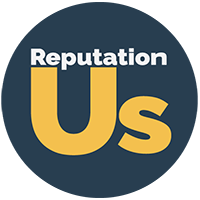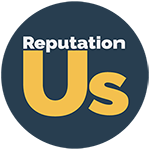The RepUs and Blue Ocean Global Technology “Reputation Health Score™” (RHS) is a quick, easy-to-understand snapshot of your organization’s reputational health. Ranging from 1 to 100, this score helps identify key areas where a company may need to allocate resources to improve or address perceptions and reputation vulnerabilities. Whether it’s customer satisfaction, employee engagement, or online reputation, the RHS highlights where action can make the most impact to enhance and advance a company’s reputation.
RHS Diagnosis
The RHS is a diagnosis of a several factors that represent an organization’s reputation. Often the goal of the RHS is to:
- Solidify and validate perceptions
- Confirm mission and core values are relevant and resonating
- Capture stakeholder insights
- Help business growth
- Align business objectives with reputational findings
- Identify vulnerabilities
- Improve reputational performance
RHS REPUTATION BENCHMARKS
These reputational benchmarks will be explored and scored as a part of the RHS process. Year-over-year, an organization can determine if its RHS has increased, decreased or was consistent in various select categories.
Primary and subcategories benchmarks for organizations to measure RHS include:
Products & Services
- Quality
- Satisfaction
- Customer Loyalty
People
- Executive Leadership
- Board of Directors
- Employee satisfaction
- Employee retention
- Employee recruitment
- Vendors
Processes
- Supply chain
- Quality and Timing of Goods or Services to Customers
Customer
- Customer Satisfaction
- Customer Retention
- Customer Recruitment
Media and Online Reputation
- Social Platforms
- Online Reviews
- Rankings
- Media coverage
Community
- Community engagement
- Advocacy
- Government relations
Competition
RHS MEASURING TOOLS
A RepUs RHS (1-100) leverages a combination of measurement tools to capture data involved in an organization’s reputation. Each deployed tool and its results are given a respective RHS, with a cumulative/total RHS assigned to an organization’s overall reputational health.
- Reputation Surveys: These are structured surveys sent to various stakeholders to gauge their perceptions of the company. The questions usually address different factors, such as trust, ethics, corporate social responsibility (CSR), innovation, leadership, and customer satisfaction.
- Net Promoter Score (NPS): This is a widely used metric that measures customer loyalty and satisfaction. It asks customers how likely they are to recommend the company to others, which is a direct indicator of corporate reputation.
- Media Monitoring: Tracking the frequency and tone of news articles, blog posts, press releases, and other media mentions. Positive, neutral, or negative sentiment in media coverage is an important indicator of public perception.
- Social Media Sentiment Analysis: Using tools to analyze social media mentions and comments on platforms like Twitter, Facebook, LinkedIn, and Instagram. Natural language processing (NLP) algorithms can assess the sentiment (positive, negative, or neutral) of posts related to the company.
- CSR Reports and Ratings: The company’s CSR initiatives and impact can play a big role in its reputation. Assessing how well a company performs on social and environmental issues can help measure its reputation, as many stakeholders value ethical business practices.
- ESG Scores: These are third-party evaluations (e.g., from agencies like MSCI, Sustainalytics, or Refinitiv) that assess a company’s commitment to sustainability, social responsibility, and good governance practices.
- Employee Surveys: Employee satisfaction surveys or engagement surveys (e.g., Gallup surveys) are critical for assessing internal perceptions of the company, as employees are key ambassadors of a company’s brand and critical to its reputation.
- Glassdoor and Job Review Sites: Reviews and ratings on platforms like Glassdoor, Indeed, and LinkedIn can provide insights into how the company is viewed by its employees and potential talent.
- Customer Satisfaction Scores: Metrics like Customer Satisfaction (CSAT), Customer Effort Score (CES), and NPS help measure how customers perceive the company in terms of product quality, customer service, and overall experience.
- Brand Equity and Recognition: Brand value surveys and brand recognition studies (e.g., Interbrand, BrandZ) measure how well the company’s brand is perceived in the marketplace.
- Reputation Indexes: Various organizations, like Reputation Institute and Edelman Trust Barometer, publish annual rankings of the most reputable companies. These indexes are based on public opinion and consider factors like products and services, innovation, workplace, governance, and social responsibility.
- Fame and Leadership Metrics: A company’s visibility in its industry and leadership position, as indicated by market share or awards won, can be an indicator of its reputation.
- Stock Price Performance: Investor sentiment, reflected in stock price movements and market performance, can indicate the overall reputation of a company. A rising stock price can suggest that the company is well-regarded by the market, while consistent negative performance may suggest otherwise.
- Investor Surveys: Surveys and interviews with institutional investors can also reveal how the company is perceived in financial markets, especially concerning governance and ethical practices.
- Online Reviews: Websites like Trustpilot, Yelp, and product review platforms (e.g., Amazon) provide a large volume of direct consumer feedback. Analyzing trends in online ratings and reviews provides insight into how public opinion can impact a company’s reputation.
- Competitive Comparison: Measuring how the company’s reputation stands relative to its competitors provides context. If a company ranks higher or lower than its peers, it can provide a clearer picture of its relative reputation in the industry.
- Crisis Impact Analysis: Evaluating the effectiveness of reputation recovery strategies following a crisis or negative incident can show how resilient a company’s reputation is. Monitoring reputation recovery over time is key to understanding the long-term health of a brand.
KEY INDICATORS TO MEASURE RHS
- Trustworthiness
- Quality of Products/Services
- Ethical Behavior
- Customer Service
- Leadership and Governance
- Innovation
- Social Responsibility
- Employee Engagement
- Public and Media Perception
- Stakeholder Relationships
BOTTOM LINE
The RHS requires a comprehensive approach that combines subjective stakeholder perceptions with objective data, allowing organizations to monitor and improve their reputation effectively. The RHS, if properly implemented, can provide an industry standard—or benchmark year-over-year—by which a company’s reputation can be measured and showcased.
BOTTOM LINE COST OF RHS
OFFERING 1
Reputation Score (Online) – $1,500
- An immediate (less than one week) score of a company’s online reputation.
OFFERING 2
Reputation Health Score (Comprehensive) – $10K-$100K
- A comprehensive analysis of a company’s reputuation offering a composite score (1-100) and designated scores based on a company’s subcategories of people, products, processes.
- Price range is based on hours time and resources needed to conduct each RHS tactics based on the company’s needs.

